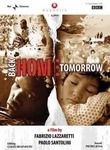Eye For Film >> Movies >> Back Home Tomorrow (2008) Film Review
Emergency is an Italian-based humanitarian agency, which aims to bring medical help, free from discrimination, to the civilian victims of conflict across the globe. Here Fabrizio Lazzaretti and Paolo Santolini head to two hotspots – a Sudanese refugee camp and Kabul, Afghanistan – to document some of the outreach work which goes on there.
The result is an observational and utterly uncompromising document of the lives of two children touched by war in very different ways. Murtaza is just a little scrap of a thing and yet he – and many others on the ward he shares – has had his life blown apart by a mine. He picked one up and lost one hand, plus the tips of his fingers on his other as a result. Fifteen-year-old Yagoub, meanwhile, is living in a refugee camp in Khartoum, where he and his mother fled to escape death in Darfur. He has a congenital heart defect, which means he can only watch as his pals play football and is looking at a radically reduced lifespan. With the operation he needs costing $5,000 – more than 15 million Sudanese dollars – Emergency’s soon-to-be-completed hospital offers him the only hope of free surgery.
Lazzaretti and Santolini are unflinching in their documentation of the lives of these kids. The opening scenes involving Murtaza, in particular, are almost unbearable to watch, with children arriving with limbs, literally, hanging off or blasted to bits - there are no cut-aways from these stark realities of war. Life in the Sudan is also documented in full, including a scene of a goat being slaughtered, the sound of which, disarmingly, recalls the cries of the children back in the hospital in Kabul.
While its fair to say that documenting things as they happen in such an observational style is probably, editing aside, the closest a viewer can ever come to seeing ‘truth’ on a cinema screen, this may well prove to be too tough a watch for many and, as a result, not reach as large an audience as it ought to. Even more chilling than the bloodshed in Kabul, however, is an eavesdropped conversation in which the injured children – all under 10 – discuss how they came to be playing with mines in the first place in a segment which suggests they are incredibly commonplace and that children haven’t been educated not to touch them (those wanting to learn more about what can be done regarding land mines, should check out www.landmineaction.org).
There is hope here, however, as well as pain and, as with so many other documentaries in war-torn places, Back Home Tomorrow shows how resilient the human spirit is, especially in the young. For example, even with Yagoub is clearly experiencing large amounts of discomfort he toughs it out telling everyone he is "fine" - a bravery of words that is mirrored in his fierce attempts to get well.
Occasionally, even without any voiceover, the editing becomes rather too obvious – such as when images of a dust storm rolling into Kabul is immediately followed by shots of armoured tanks driving through the city – but, on the whole, this offers a well constructed and thoughtful window onto two very different, yet equally pressing, humanitarian crises.
Reviewed on: 26 Mar 2009

















